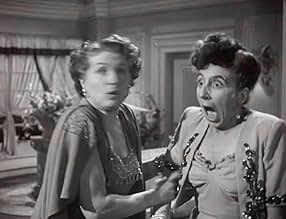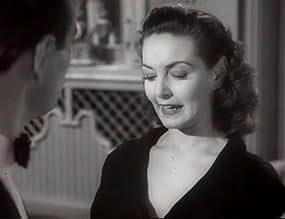Aggiungi una trama nella tua linguaUpper class young man has to resort to employment, together with his valet/butler in tow. He finds a job escourting a robot out for an evening, and they end up in a hotel and a farce ensues ... Leggi tuttoUpper class young man has to resort to employment, together with his valet/butler in tow. He finds a job escourting a robot out for an evening, and they end up in a hotel and a farce ensues when roles are swapped.Upper class young man has to resort to employment, together with his valet/butler in tow. He finds a job escourting a robot out for an evening, and they end up in a hotel and a farce ensues when roles are swapped.
- Regia
- Sceneggiatura
- Star
- Lady Diana
- (as Anita Bolster)
- Telephonist
- (non citato nei titoli originali)
- Well Dressed Man On Underground
- (non citato nei titoli originali)
Recensioni in evidenza
In a short role as a effeminate dress sales clerk, Jerry Desmonde goes as far as you could without shouting out 'gay man,' in the days of fifties cinema. Pity his later roles were mainly playing stooge to the likes of Norman Wisdom.
This type of broad slapstick farce and comedy of errors was slowly dying out to be replaced by the more subtle Ealing comedies. And wouldn't really return till the more risqué Carry Ons of the swinging sixties.
All a bit dated in all and only vaguely amusing in the sense of 'they don't make them like that any more' type of way.
The film was a success when first released, but it is not well-known today, even though it occasionally turns up on television. I note that mine is only the twelfth review it has received. This is probably because it is an adaptation of a farce originally written for the stage. Farce was once a popular genre in the British theatre, but has lost ground in recent decades, and never really transferred well to the screen. For example, "No Sex Please, We're British" was a huge hit in the theatre during the seventies and eighties, but the film version was less successful even at the time, and is virtually unwatchable today, as is "Don't Just Lie There, Say Something!", another seventies film based upon a stage farce. Both those films are based upon the lazy assumption that sex is hilariously funny and that any mention of a sexual topic must therefore be good for a laugh. "The Perfect Woman" is not quite as bad as either of those awful examples, largely because in the forties both the Lord Chamberlain's Office, which governed censorship in the theatre, and its cinematic equivalent, the British Board of Film Censors, took a puritanical view of sexual humour, meaning that comic playwrights and screenwriters had to work harder for their laughs.
I can imagine that a film like this came across as quite funny in 1949. The lovely Patricia Roc makes Penelope a spirited heroine. I assumed that Roc was also playing Olga the Robot, but in fact that role went to an otherwise little-known actress named Pamela Devis, cast on the basis of her physical resemblance. (With modern computer trickery it would today be quite easy to have the same actress playing two different characters in the same scene, but perhaps this would not have been possible in the forties). Nigel Patrick and Stanley Holloway, however, seem to be trying too hard as Cavendish and Ramshead; Holloway in particular came across as too frenetic, which disappointed me as I have admired some of his other performances such as those he gave in "Passport to Pimlico" (also from 1949) and "My Fair Lady". The main problem with the film, however, is that its style of humour seems just too old-fashioned for the tastes of modern audiences. 5/10.
It really was amazing how quickly two people could fall in love back in 1949 - That was the only note I took down whilst watching this film and sadly, because it was a bit forgettable, I can't really think what else to write about it in this review.
I know that it wasn't offensive and that there was a charm to it and an element of fun, but I don't think that I could really say much about the general construction of the film.
The only characters I can recall were the professor who invented the "Perfect Woman" and who was cute in his own way, but quite typical of inventors in film and also Stanley Holloway's butler, a man who knew his place, but didn't stay there.
I'm sure that they all gave perfectly adequate performances, because otherwise I would have made a note of it and I know that Irene Handl usually delivers a great character, but perhaps there have just been too many of this type of film that meant it didn't leave a specific mark.
The actual robot needing instructions to move or do anything, was a bit silly, like the daft scene in 'Mrs Doubtfire' (1993), where Robin Williams had to keep changing personas over dinner and that was a tired humour even in 1949 as far as I'm concerned.
So while it wasn't a bad film, it really didn't make any kind of impression on me and I wouldn't bother with it again.
380.61/1000.
Although this truly bizarre farce seems on paper crying out for a disclaimer on Talking Pictures deploring it's attitude to women, it's actually the men who are portrayed as useless (no mean feat when played by the usually accomplished Nigel Patrick & Stanley Holloway) and the audience is laughing with Patricia Roc and Irene Handl rather than at them.
Plushly appointed but very silly, with Mickey Mousing music cues which which make it even more unfunny than it already would have been; it was dismissed by Denis Gifford as "heavy-going froth". And I'll go along with that.
Lo sapevi?
- QuizPamela Devis's debut.
- Citazioni
Mrs. Butters: You and your Mars and your Jupiter. Why don't you come down to Earth for a change?
I più visti
Dettagli
- Tempo di esecuzione1 ora 29 minuti
- Colore
- Proporzioni
- 1.37 : 1




















